Phyllis: Winter has come down like a snowy blanket, and animals in our world have migrated, hibernated, or are shivering their way through the months ahead. But animals in picture books have other ideas. Why not be a part of December’s celebrations of Hanukkah, Christmas, Solstice or help a friend in frozen need? These books make us feel as cozy as a cup of tea, a lighted tree.
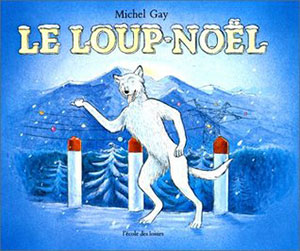 Michael Gay’s The Christmas Wolf was originally published in France as Le Loup Noël. Fortunately for us, it was also published in English in 1980 by Greenwillow Books. Father Wolf and his family live in the mountains in an abandoned powerhouse. When the wolf cubs wonder why Father Christmas never comes to them, Father Wolf decide something must be done and heads to town. He is run off the road by a truck and lands in the dump, where he fashions a disguise from a hat, boots, a long coat, and sunglasses. But it’s hard to hide his wolfish tendencies at the store in town, where a revolving door baffles him, and salespeople wonder when he says that his wife prefers a bone to jewelry. In the toy section his excitement causes him to forget his disguise, and his tail gives him away. In the outcry, Father Wolf hides in a wintry window display, finally returning home empty handed that night. The same truck that ran him off the road, returning from town, manages to hit him, and when he howls in pain Mother Wolf finds him and helps him home. The truck drivers, frightened by the howl, leap from the truck, which pitches down the mountainside, scattering the presents it carried. In the morning, the animals find presents everywhere — in trees, on the ground. A bandaged and recovering Father Wolf really has brought Christmas to the delighted animals. The last two spread show a pleased Father Wolf and wife and animals gleefully opening presents, reading books, playing a guitar, and finding all sorts of Christmas surprises. Even though each side of a spread shows a separate image, Gay’s art flows seamlessly as we journey along with Father Wolf and feel immense satisfaction along with him at the end.
Michael Gay’s The Christmas Wolf was originally published in France as Le Loup Noël. Fortunately for us, it was also published in English in 1980 by Greenwillow Books. Father Wolf and his family live in the mountains in an abandoned powerhouse. When the wolf cubs wonder why Father Christmas never comes to them, Father Wolf decide something must be done and heads to town. He is run off the road by a truck and lands in the dump, where he fashions a disguise from a hat, boots, a long coat, and sunglasses. But it’s hard to hide his wolfish tendencies at the store in town, where a revolving door baffles him, and salespeople wonder when he says that his wife prefers a bone to jewelry. In the toy section his excitement causes him to forget his disguise, and his tail gives him away. In the outcry, Father Wolf hides in a wintry window display, finally returning home empty handed that night. The same truck that ran him off the road, returning from town, manages to hit him, and when he howls in pain Mother Wolf finds him and helps him home. The truck drivers, frightened by the howl, leap from the truck, which pitches down the mountainside, scattering the presents it carried. In the morning, the animals find presents everywhere — in trees, on the ground. A bandaged and recovering Father Wolf really has brought Christmas to the delighted animals. The last two spread show a pleased Father Wolf and wife and animals gleefully opening presents, reading books, playing a guitar, and finding all sorts of Christmas surprises. Even though each side of a spread shows a separate image, Gay’s art flows seamlessly as we journey along with Father Wolf and feel immense satisfaction along with him at the end.
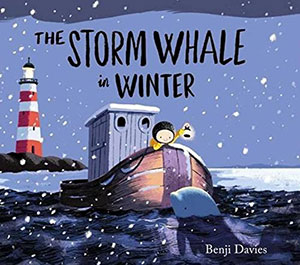 The Storm Whale in Winter by Benji Davies, is a sequel to The Storm Whale in which a little boy, Noi, rescued a stranded whale washed up by a storm. Noi, who lives with his father and six cats by the sea, keeps searching the water for his whale friend with no success. Winter descends, and Noi’s father leaves for one last fishing trip, even though the sea is filling with ice. When he doesn’t return by darkness, Noi thinks he sees his father’s boat out to sea and hurries across the ice to find it. The boat, when he reaches it, is held fast by ice, and Noi’s father is not aboard. Afraid and not knowing what else to do, Noi curls up tight in a blanket. Suddenly the boat feels a BUMP. The storm whale and his whole family have come to help. They punch through the ice, singing, and push the boat back to the shore, where Noi’s father had been brought when rescued by other fishermen. The art shows Noi together with his father in the spring, painting the boat which they rename The Storm Whale in honor of the night Noi’s friend had come back, then sailing together among the whales.
The Storm Whale in Winter by Benji Davies, is a sequel to The Storm Whale in which a little boy, Noi, rescued a stranded whale washed up by a storm. Noi, who lives with his father and six cats by the sea, keeps searching the water for his whale friend with no success. Winter descends, and Noi’s father leaves for one last fishing trip, even though the sea is filling with ice. When he doesn’t return by darkness, Noi thinks he sees his father’s boat out to sea and hurries across the ice to find it. The boat, when he reaches it, is held fast by ice, and Noi’s father is not aboard. Afraid and not knowing what else to do, Noi curls up tight in a blanket. Suddenly the boat feels a BUMP. The storm whale and his whole family have come to help. They punch through the ice, singing, and push the boat back to the shore, where Noi’s father had been brought when rescued by other fishermen. The art shows Noi together with his father in the spring, painting the boat which they rename The Storm Whale in honor of the night Noi’s friend had come back, then sailing together among the whales.
Both of these are simply told, straightforward stories, and yet both touch the heart unsentimentally. Father Wolf wants to make his children happy with the gift of Christmas, and Noi wants both to find his friend and also his father. Both stories end with goals achieved, but not until after difficulty, which makes their success even sweeter.
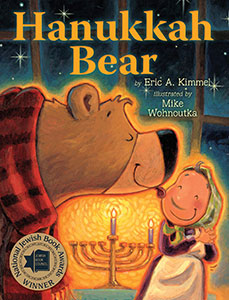 Jackie: The bear in The Hanukkah Bear (by Eric Kimmell and illustrated by Mike Wohnoutka; 2013) has an easier time of it. He wakes up mid-winter to a delicious smell, which he follows to the house of 97-year old Bubba Brayna. She doesn’t see as well as she used to, nor hear as well. But she still makes the best latkes around. And this night she makes twice as many because the Rabbi is coming.
Jackie: The bear in The Hanukkah Bear (by Eric Kimmell and illustrated by Mike Wohnoutka; 2013) has an easier time of it. He wakes up mid-winter to a delicious smell, which he follows to the house of 97-year old Bubba Brayna. She doesn’t see as well as she used to, nor hear as well. But she still makes the best latkes around. And this night she makes twice as many because the Rabbi is coming.
Bubba Brayna welcomes the bear, whom she mistakes for the Rabbi, and interprets his grunts and growls as the Rabbi’s part of the conversation. He devours the latkes. Bubba Brayna laughs at his appetite and wipes of his face. “You eat like a bear,” she says in a teasing way. She gives him a scarf and wishes him a happy Hanukkah.
Bubba Brayna is charming in her simple generosity and acceptance of a Rabbi who eats with his paws. And she is gracious when the real rabbi comes with neighbors, and the children see tracks and tell her it was a bear she had fed.
Some may see this story as fun at the expense of someone who doesn’t see or hear as well as she used to. But I love it for the qualities in Bubba Brayna that allow her to be generous with a messy imagined Rabbi, laugh at her own mistake — and solicit her friends’ help in whipping up another batch of latkes. Would that we all could overcome our mistakes with such grace.
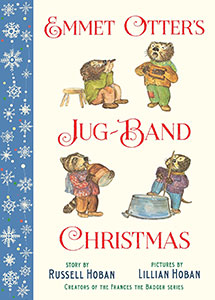 One last animal story, or sort of. Russell Hoban’s otters are the people we wish we could be. We have included this book in the past, but it is so good, so warm, we just have to mention it again. Emmet Otter’s Jug-Band Christmas (1971) was written by Russell Hoban and illustrated by Lillian Hoban. I have loved this story for most of my adult life. We found it when our kids were young and read it for years – all year long. It is always fun to watch the Jim Henson 1977 Muppet production of this story, but the book is my favorite telling.
One last animal story, or sort of. Russell Hoban’s otters are the people we wish we could be. We have included this book in the past, but it is so good, so warm, we just have to mention it again. Emmet Otter’s Jug-Band Christmas (1971) was written by Russell Hoban and illustrated by Lillian Hoban. I have loved this story for most of my adult life. We found it when our kids were young and read it for years – all year long. It is always fun to watch the Jim Henson 1977 Muppet production of this story, but the book is my favorite telling.
Ma Otter says to her friend Irma Coon, “It’s been such a rock-bottom life for so long, just once I’d like to bust out with a real glorious Christmas for Emmet — something shiny and expensive.” And Emmet says to his friend Charlie Beaver, “Sometimes [Ma’s] got to have something fine and fancy.” When they hear of the talent show with the fifty-dollar prize, Emmet drills a hole in Ma’s washtub to be part of the Frogtown Hollow Jug Band and Ma sells Emmet’s toolbox to buy fabric for a fancy dress to wear as she sings in the contest.
But no one had counted on the Riverbend Nightmare band with their electrical instruments and raucous (rock-us?) sound. After the Nightmare performance, Ma sounded like a whisper. Emmet’s band sounded like “crickets and night peepers.” Still, as they walk home, Ma says, “I guess I ought to feel pretty bad, but the funny thing is I don’t. I feel pretty good.” And they start to make music. And their music is heard…and appreciated by all the customers at Doc Bullfrog’s Riverside Rest. A free supper and a night of entertaining follow. And they all go home with a regular job at Doc Bullfrog’s and money in their pockets.
Ma and Emmet are so spunky. Hoban’s language is so entertaining. We all have days that we want to call “rock-bottom.” And we hope for times when maybe we should feel pretty bad, but we feel pretty good. This story is a classic and bears reading again and again.
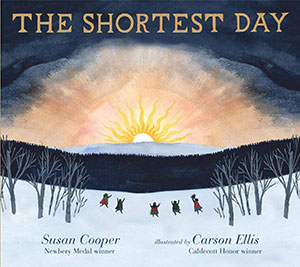 Phyllis: The sparest of poetic texts (121 words by my quick count) flows through Susan Cooper’s The Shortest Day, a solstice celebration.
Phyllis: The sparest of poetic texts (121 words by my quick count) flows through Susan Cooper’s The Shortest Day, a solstice celebration.
Jackie: An end note tells us Cooper wrote the poem for “The Christmas Revels,” a solstice celebration begun by John Langstaff in 1957 and revived in 1971 and celebrated in cities all over the country.
Phyllis: The dark art, soft as a winter’s night, is lit by candles in window and torches in hands as “everywhere, down the centuries of the snow-white world came people singing, dancing, to drive the dark away.” They hang homes with evergreens and burn fires to waken the new year’s sun. When the sun returns, they “carol, feast, give thanks, and dearly love their friends, and hope for peace. And so do we, here, now….”
And we, too, wishing you dear friends that in the coming year we drive the dark away, commit to celebrations, and find peace and joy.
